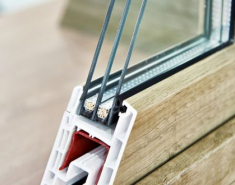The Best Glass Cleaner Options for the Home
Cleaning glass is an easy housekeeping chore to skip—until suddenly all you see are streaks of grime, islands of dust, and enough fingerprints to stymie a team of CSIs. Rather than let it get that far, regularly wiping down windows, mirrors, and other glass surfaces will ensure that your home literally sparkles. While some folks prefer to make their own glass cleaner, most prefer the convenience of buying it ready to use. However, there’s a vast array of formulas, ingredients, and uses that can make choosing a product a trickier process than you might expect.
So read on to understand what goes into the best glass cleaner and get dependable product recommendations from consumers like you.
Clearing Up Glass Cleaner Confusion
While glass cleaner might not be the most complex product, there are still a few things to consider when buying one.
Glass cleaner comes in three basic formats: liquid, foam, and wipes.
Liquid glass cleaner is the most familiar type and the handiest for everyday use around the home. The majority of liquid glass cleaners are sold in spray bottles, although a few are in aerosol cans. You’ll also find liquid glass cleaners in bottles that attach to a garden hose for cleaning outdoor windows. To avoid liquid running down vertical glass surfaces and dripping onto the furniture or floor underneath, it’s best to mist these cleaners onto a cleaning cloth–preferably microfiber, which won’t leave lint on the glass–and then wipe the glass with the cloth.
Foam glass cleaners, usually in aerosol cans, are often extra-strength products designed to effectively tackle the toughest glass grunge, such as bird droppings on car windows, watermarks on shower doors, and dried toothpaste globs on bathroom mirrors. Because the foam clings, you needn’t worry about cleaner dripping down vertical glass surfaces, so you can spray the product directly onto the glass and then wipe with your microfiber cloth.
Glass cleaning wipes are use-and-toss products that make light household cleaning a snap. Though very convenient for quick touchups, they generally aren’t as effective as liquid or foam cleaners for greasy, sticky, or thick messes, and they tend to leave more streaks. Wipes also dry out quickly if you don’t reseal the package correctly after use.
Pay attention to the active ingredient.
The majority of commercial glass cleaners have a fairly lengthy list of chemical ingredients with various functions, but for most consumers, there are two general camps of these products: those with alcohol or ammonia as their main active ingredient, and those with gentler, “greener” active ingredients.
Ammonia is one of the most common and inexpensive active ingredients in traditional commercial glass cleaners, because it very effectively cuts through grease, dirt, fingerprints, dried cooking spills, and other typical glass grunge while also killing some germs. It even evaporates fast, leaving behind a streak-free surface. The downside? Ammonia can be very irritating to the respiratory system, skin, eyes, and throat. If you use an ammonia-based cleaner in a small, closed space, such as a bathroom, you’re likely to cough or feel discomfort in your throat and chest. Breathing in large quantities of ammonia can lead to chemical pneumonia. Spilled on skin, it can cause chemical burns, and a splash in your eyes potentially can blind you. Still, for the majority of homeowners without existing respiratory sensitivities, use of ammonia-based glass cleaners as directed and with good ventilation (open windows and doors, turn on any nearby fans) is unlikely to do any harm.
Isopropyl alcohol, more commonly called rubbing alcohol, is another common active ingredient found in many glass cleaners. Like ammonia, it effectively cuts through grease and other tough grunge, evaporates extremely quickly, and kills many types of germs. While isopropyl alcohol isn’t likely to cause harm if used correctly and with proper ventilation, it is potentially quite toxic if consumed, sprayed into the eyes, or spilled in large quantities onto the skin, where it quickly absorbs and can cause symptoms such as dizziness, rapid heartbeat, slowed breathing, confusion, and nausea.
White vinegar, perhaps the most common active ingredient in natural commercial glass cleaners, as well as DIY blends, is effective at cutting through grease and grime, and although it doesn’t have a pleasant smell, it’s not likely to irritate your respiratory system, eyes, or skin the way ammonia and alcohol can. Because vinegar evaporates fairly quickly, it leaves a mostly streak-free finish. And while not as powerful as ammonia and alcohol, vinegar does have mildly antibacterial properties to kill germs on surfaces.
A variety of plant-based active ingredients, such as thyme, eucalyptus, pine, and mint, may go into today’s totally nontoxic and sometimes pleasant-smelling household glass cleaners. Generally sufficient for general cleaning around the house, they often aren’t as tough on grease, dried toothpaste, and other heavy-duty grunge, and their antibacterial abilities are less when compared to other types of cleaners.
Some glass surfaces require specialty glass cleaners.
You can safely use any type of glass cleaner on untinted windows, mirrors, glass shelves and tables, glass shower doors, tile, and other hard, sealed surfaces. But some surfaces call for specially formulated cleaners.
Source: https://bit.ly/2Ya7tjK









